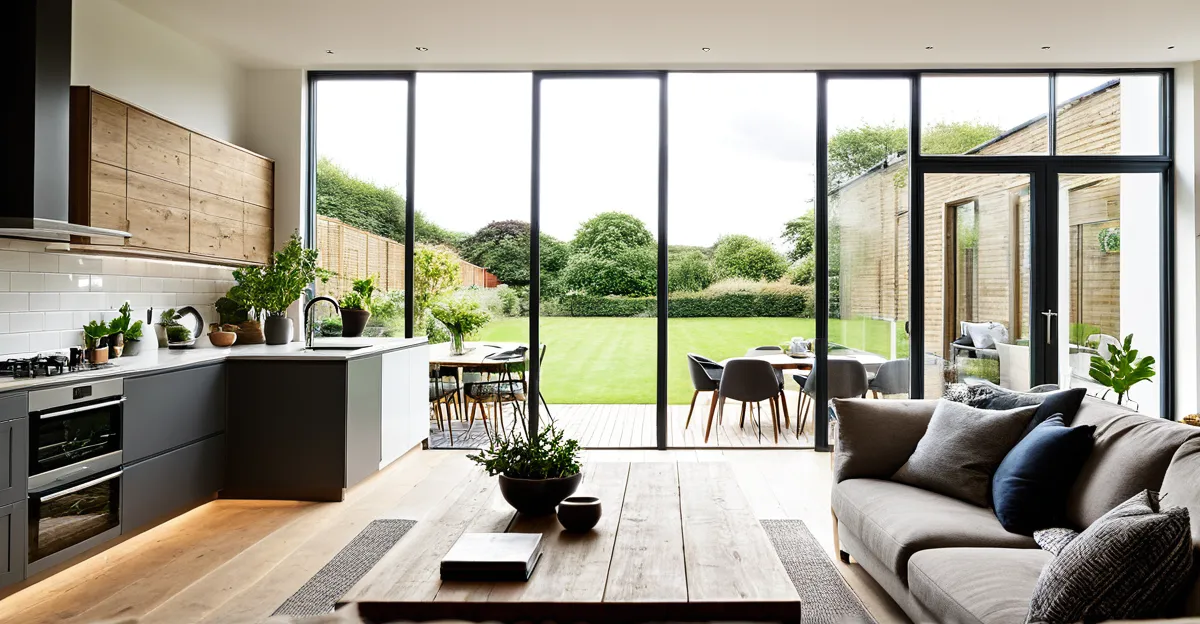Energy-Efficient Appliances
Adopting energy-efficient appliances is a vital step towards achieving an eco-friendly home. These appliances consume less electricity, which not only reduces energy bills but also decreases the overall carbon footprint of your household. Here, we explore the benefits, recommended brands, and tips to maximize their efficiency.
Benefits of Energy-Efficient Appliances
These appliances are designed to use less energy. This is not just cost-effective in reducing your utility bills, but it also plays a crucial role in conserving natural resources. According to recent studies, switching to energy-efficient models can lead to a significant reduction in greenhouse gas emissions.
This might interest you : How Can Mindful Home Design Enhance Well-being?
Recommended Brands and Models in the UK
When it comes to choosing these appliances, several brands in the UK are noted for their commitment to efficiency and sustainability. Brands like Bosch, LG, and Miele offer a range of high-standard options. Models with the Energy Star label are particularly recommended as they meet strict energy efficiency guidelines set by the UK government.
Tips for Maximizing Energy Efficiency at Home
To make the most out of your energy-efficient appliances, consider incorporating simple strategies into your daily routine:
Also read : What Unique Challenges Come With Decorating a Living Room in the UK?
- Proper Maintenance: Regularly cleaning filters and components ensures appliances function optimally.
- Usage Habits: Only run dishwashers and washing machines with full loads to maximize efficiency.
- Smart Home Integration: Using smart plugs and timers can help automate and optimize appliance usage.
Incorporating these appliances into your home is a strategic move towards sustainability, offering long-term savings and environmental benefits.
Renewable Energy Sources
Incorporating renewable energy into your home can provide numerous advantages. Solar panels and wind energy are among the most accessible options for homeowners in the UK. These systems can significantly reduce reliance on fossil fuels and lower electricity costs over time. By generating clean energy, not only do they help the environment, but they also increase the energy independence of your household.
Integrating Solar Panels and Wind Turbines
Installation of solar panels is a popular method for harnessing renewable energy. They can be mounted on rooftops and connect directly to your home’s power supply, converting sunlight into electricity. Similarly, wind turbines can be utilized in areas with adequate wind speeds, effectively generating power for residential use. Both options require initial investment, but government incentives and increasing affordability enhance their viability.
Government Grants and Incentives
The UK government offers various grants and incentives to support renewable energy installations. These include financial schemes that help offset initial costs, making renewable options more accessible. Homeowners can apply for these benefits to reduce financial barriers and promote the wider adoption of green energy solutions. It’s crucial to explore and understand these offerings as they play a vital role in encouraging the shift towards sustainable energy in homes.
Eco-Friendly Building Materials
Incorporating eco-friendly materials into your home renovations is essential for sustainable construction. These materials not only reduce environmental impact but also offer long-term benefits for homeowners. Opting for products with low environmental footprints, such as recycled metal, bamboo, and cork, can significantly lower emissions associated with building and renovation processes.
Types of Eco-Friendly Materials for Home Renovations
Choosing the right eco-friendly materials is crucial for ensuring both quality and sustainability. Bamboo, for instance, is a fast-growing plant that regenerates quickly, making it an excellent choice for flooring and furniture. Recycled metal is another viable option, used for roofing and structural elements. Cork, known for its insulation properties, is ideal for flooring and wall coverings.
Sourcing Sustainable Materials in the UK
Finding sustainable materials in the UK can be simplified through local suppliers specializing in eco-friendly products. Companies offering reclaimed wood, recycled glass, and other environmentally responsible options can play a pivotal role in green renovations. Many of these suppliers provide detailed sourcing information, ensuring transparency and support for sustainable practices.
The Impact of Eco-Friendly Materials on Home Value
Utilizing eco-friendly materials can positively impact a home’s market value. As more buyers seek environmentally responsible properties, homes featuring sustainable construction elements often enjoy increased demand. Moreover, these materials can lead to energy savings and reduced maintenance costs over time, making them a worthwhile investment for both current and future homeowners.
Incorporating Indoor Plants
Embracing the use of indoor plants in your home can significantly enhance your well-being while promoting green living. These plants not only provide aesthetic beauty but also contribute to improving air quality. By introducing indoor greenery, you can transform your living space into a healthier and more refreshing environment.
Benefits of Indoor Plants for Health and Well-Being
Indoor plants are known for their ability to purify air by absorbing toxins and releasing oxygen, thereby enhancing air quality. They can reduce stress, improve concentration, and even boost mood, making them an excellent addition to your daily surroundings. Research shows that interaction with nature, even indoors, can lead to improved psychological comfort and focus.
Best Indoor Plants for UK Homes and Their Care
When selecting indoor plants for UK homes, species such as the peace lily, snake plant, and aloe vera are highly recommended due to their low maintenance and air-purifying properties. Each of these plants requires minimal watering and can thrive in indirect sunlight, making them perfect for those new to plant care. Regular dusting of the leaves and occasional fertilizing will keep them healthy and vigorous.
How Indoor Plants Contribute to a Greener Home Environment
By incorporating indoor plants, you not only create a visually appealing space but also actively contribute to a greener home environment. These plants naturally regulate humidity and detoxify air, promoting a sustainable living atmosphere. Moreover, they help reduce the need for artificial air fresheners and contribute to an eco-friendly lifestyle, aligning with broader goals of green living.
Waste Reduction Practices
Promoting waste reduction is essential for creating a sustainable lifestyle. In the UK, there are numerous strategies to effectively minimize household waste and contribute to a cleaner environment. Implementing these practices not only enhances ecological balance but also fosters a sense of community responsibility.
Strategies for Reducing Household Waste in the UK
Waste reduction can begin with simple yet impactful changes in daily routines. Prioritising the use of reusable bags over plastic and opting for products with minimal packaging are effective approaches. Composting organic waste at home is another key practice, transforming food scraps and garden waste into valuable compost for plants. Additionally, purchasing items in bulk can drastically decrease packaging waste.
The Importance of Recycling and Composting
Engaging in recycling is crucial for reducing landfill usage. By segregating recyclables like paper, plastic, and glass, households can greatly diminish their impact on the environment. Composting, in particular, plays a significant role in waste reduction by diverting organic waste from landfills, reducing methane emissions, and enriching soil quality with natural fertilizers.
Community Resources for Waste Management and Reduction
Communities across the UK offer resources to aid in waste reduction. Local councils often provide recycling centres and composting workshops to educate residents about sustainable practices. Additionally, initiatives like repair cafes and swap events encourage the reuse and repurposing of goods, fostering a culture of sharing and collaboration. Engaging with these resources can be instrumental in achieving a zero-waste lifestyle, making it easier for individuals to adopt and sustain green habits.
Local Resources and Government Incentives
Turning your home eco-friendly in the UK can be accelerated by tapping into available local resources and government incentives. As you embark on this journey, understanding the regional initiatives and funding opportunities can significantly enhance your ability to make greener choices.
Overview of Local Organizations Supporting Sustainable Living
Several local organizations across the UK are dedicated to assisting homeowners in adopting sustainable living practices. These organizations provide educational programs, workshops, and resources aimed at increasing awareness and practical knowledge about eco-friendly options. Participating in local environmental groups or attending community events can connect you with like-minded individuals and share valuable experiences and advice.
Available Government Incentives for Eco-Friendly Home Improvements
The UK government offers a variety of incentives to encourage eco-friendly home improvements. These incentives are designed to reduce the initial cost burdens associated with upgrades such as installing solar panels or switching to more energy-efficient appliances. Financial support may come in the form of grants, tax credits, or rebates that facilitate the transition to a more sustainable home. It’s essential to research and understand these benefits before embarking on any renovation project to maximise your cost savings.
How to Find and Apply for Funding and Support
Locating and applying for funding and support requires a bit of research. Start by visiting government websites and consulting local council offices for the latest updates on available schemes. Online platforms dedicated to green living are also valuable resources, providing updated information on grants and incentives. When applying, ensure you have all the required documentation ready, such as detailed project plans and proof of property ownership, to streamline the application process. Engaging with these opportunities can make significant impacts on your journey towards a sustainable, eco-friendly home.
DIY Projects for a Greener Home
Growing interest in sustainability has inspired many homeowners to embark on DIY projects to create a more eco-friendly home. These projects are not only cost-effective but also empowering, allowing you to personally contribute to environmental conservation while enhancing your living space.
Simple DIY Projects to Enhance Sustainability
Creating a rainwater harvesting system is one simple project to start with. This involves setting up a system to collect runoff from your roof, reducing water consumption for gardening. Another accessible initiative is making your own compost bin, turning kitchen scraps into nutrient-rich fertilizer for your plants. Upcycling furniture, such as repainting old chairs or tables, is another popular method to minimize waste.
Resources for Sourcing Materials and Inspiration
The internet is a treasure trove of resources for sourcing materials and gaining inspiration for DIY projects. Websites focused on green living offer detailed guides and forums where individuals share their experiences. Additionally, many local markets have begun catering to the eco-conscious, offering materials like recycled wood and eco-friendly paints. Engaging with community workshops can also provide hands-on guidance and inspiration.
Success Stories from UK Homeowners who Went Green with DIY
Across the UK, numerous homeowners have effectively implemented DIY projects to enhance the sustainability of their homes. One notable case is a family in Bristol who transformed their garden with upcycled planters and a handmade greenhouse using reclaimed windows. Another is a couple in Manchester who integrated energy-efficient lighting throughout their home, significantly reducing their electricity consumption. These stories not only highlight the feasibility of such projects but also motivate others to embark on their own green initiatives.






